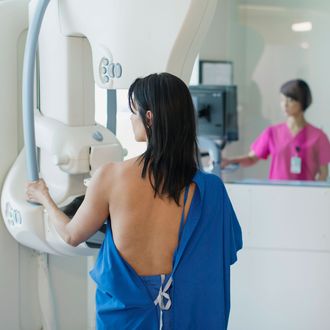
It’s becoming a more common medical story: A woman is diagnosed with cancer in one breast, and she chooses to undergo a mastectomy — not just to remove the affected breast, but the other one, too. Some call it the Angelina Jolie Effect, after the actress wrote about her decision to undergo a preventive double mastectomy in 2013, although the numbers show that women were increasingly choosing this option before Jolie went public with her choice. According to a recent report in Mother Jones, the rate of female breast-cancer patients opting to remove a healthy breast has tripled in just ten years, from 4 percent in 2002 to 13 percent in 2012.
The surgery, which is called a contralateral prophylactic mastectomy, is considered a risky one; all surgeries, of course, are. And yet a new report from the journal Annals of Surgery shows that there is no evidence to suggest that this particular procedure even works — despite the prevention efforts of these women, there was no improvement in their overall chances of survival.
This type of finding is usually reported, by medical experts and veteran health journalists alike, with a finger-wagging tone. Don’t these women know they’re taking an unnecessary risk by choosing a surgery with potential harms that don’t outweigh the benefits? But this attitude at least partially misses the point, by overlooking the role psychology plays in making this hugely difficult medical choice. Uncertainty, for example, is a terrifically difficult state of mind to live with. One classic study in the 1960s suggested that if you give people the option of definitely receiving a painful electric shock right now, or maybe — but maybe not — receiving one several moments from now, most will choose the former option. The devil you know, et cetera.
And this way of thinking isn’t confined to psychology labs. In a Reddit AMA, for example, journalist and author Lizzie Stark answered questions about her decision to undergo a double mastectomy at 28, after learning she carried the gene mutation that put her at a higher risk for developing breast cancer. At one point, her “mammograms began to come back saying things like ‘probably benign,” she writes. “I could live with that level of uncertainty in my life.”
Elsewhere in the Q&A session, Stark elaborated:
I spent 28 years with one sort of body, and then overnight, my dimensions changed. Not seriously, but subtly. That was jarring. I also have no skin sensation in much of my breasts, so I have to be careful about the temperature of my shower and hotpads. Finding out I was BRCA1 threw me into a sea of depression and constant worrying about cancer. Having the mastectomy helped me get rid of that worry and return to normal life. So it’s changed me permanently, but for the better I think. I feel I can live more of a normal life now.
As Science of Us has reported before, people have differing levels of ambiguity tolerance — that is, some of us are just better at accepting life’s uncertainties than others. Some breast-cancer patients — or some who have discovered they carry the BRCA mutation — may be better at accepting the uncertainty of their circumstances than others. Even so, doctors should be careful not to overlook the psychology at work here when discussing this weighty decision with their patients.

